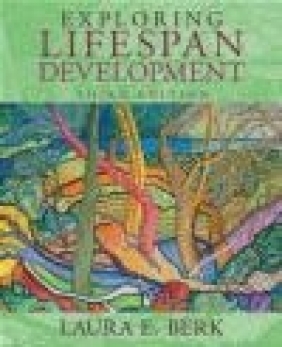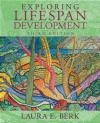Exploring Lifespan Development
Laura Berk
Exploring Lifespan Development
Laura Berk
- Producent: Pearson
- Rok produkcji: 2013
- ISBN: 9780205957385
- Ilość stron: 696
- Oprawa: Miękka
Niedostępna
Opis: Exploring Lifespan Development - Laura Berk
Visit the Preview Website to see sample chapters, get information on the supplements (including sample videos and on-line simulations), and much more, click here. This shorter, essentials version of Berk's best-selling Development Through the Lifespan, 6/e, covers the same topics and contains the same number of chapters, but presents only the essential information with an exceptionally strong emphasis on applications. Exploring Lifespan Development includes all the features Berk's texts are known for: Engaging writing style, exceptional multicultural and cross-cultural focus, cutting-edge consideration of the interrelationships between heredity and environment, rich examples, the most up-to-date research, and practical applications that help students relate the subject to their personal and professional lives. Authored by Laura Berk, MyDevelopmentLab for Exploring Lifespan Development engages students through personalized learning, and helps them better prepare for class, quizzes, and exams. It also helps instructors with course preparation, content delivery, and assessment. MyDevelopmentLab includes extensive video footage, multimedia simulations, "Careers in Development," and interactive activities-all produced by the author and unique to Exploring Lifespan Development. NOTE: This is the standalone book, if you want the book/access card order the ISBN below: 0205968961 / 9780205968961 Exploring Lifespan Development Plus NEW MyDevelopmentLab with eText -- Access Card Package Package consists of: 0205909744 / 9780205909742 NEW MyDevelopmentLab with Pearson eText -- Valuepack Access Card -- for Laura E. Berk 0205957382 / 9780205957385 Exploring Lifespan Development "One of the best textbooks I have ever reviewed. You do a great job of using research-based material, provide clear statements describing complicated issues, provide useful summaries, and write in a way that enhances student interest and learning."- Dale Lund, California State University, San Bernardino "Berk's textbook provides a structured and interesting journey though life. The students feel engaged and challenged. I feel confident that they will leave my course knowledgeable about social, developmental, emotional, cognitive, and neurological dimensions of being a developing human."-Carla Bluhm, College of Coastal Georgia "The writing style is extremely fluid, easy to read, and engaging."-Cheryl Anagnopoulos, Black Hills State University "The research is absolutely current, relevant, and well-integrated throughout the text."- Lori Bica, University of Wisconsin, Eau Claire "Laura Berk has included more diversity content (in both regular text and various boxes) than in any other comparable text. Bravo for Berk."-Tracie Blumentritt, University of Wisconsin, La Crosse "Laura Berk's text includes the most comprehensive, up-to-date information. Her presentation of research-based content is enhanced with real-life examples with which students can identify. The text is a fascinating read that delves into multicultural content and controversial issues related to all aspects of human development." - Holly Beth Beard, Midlands Technical College "The coverage of research and information relevant to cross-cultural differences ... highlights how another culture's practices might reflect an improvement over the ones that are familiar to us."-Debra McGinnis, Oakland University "This text does a good job of highlighting some of the more positive aspects related to aging."-Melinda Heinz, Iowa State University, "The tables, charts, photos and ... specific pedagogical tools enhanced the experience rather than being a distraction."- Joseph Kishton, University of North Carolina, Wilmington "I think students need stories to serve as frameworks for thinking about developmental concepts, and this text provides that."-Mary Ann Erickson, Ithaca College "I have happily used various editions of Laura Berk's text for more than ten years. Popular with students and faculty alike, Berk's work is thoroughly grounded in robust scientific research and is readable, timely, and interesting." - Ann Kaiser Stearns, Community College of Baltimore CountyIn this Section: 1. Brief Table of Contents 2. Full Table of Contents Brief Table of Contents PART I. THEORY AND RESEARCH IN HUMAN DEVELOPMENT Chapter 1: History, Theory, and Research Strategies PART II. FOUNDATIONS OF DEVELOPMENT Chapter 2: Genetic and Environmental Foundations Chapter 3: Prenatal Development, Birth, and the Newborn Baby PART III. INFANCY AND TODDLERHOOD: THE FIRST TWO YEARS Chapter 4: Physical Development in Infancy and Toddlerhood Chapter 5: Cognitive Development in Infancy and Toddlerhood Chapter 6: Emotional and Social Development in Infancy and Toddlerhood PART IV. EARLY CHILDHOOD: TWO TO SIX YEARS Chapter 7: Physical and Cognitive Development in Early Childhood Chapter 8: Emotional and Social Development in Early Childhood PART V. MIDDLE CHILDHOOD: SIX TO ELEVEN YEARS Chapter 9: Physical and Cognitive Development in Middle Childhood Chapter 10: Emotional and Social Development in Middle Childhood PART VI. ADOLESCENCE: THE TRANSITION TO ADULTHOOD Chapter 11: Physical and Cognitive Development in Adolescence Chapter 12: Emotional and Social Development in Adolescence PART VII. EARLY ADULTHOOD Chapter 13: Physical and Cognitive Development in Early Adulthood Chapter 14: Emotional and Social Development in Early Adulthood PART VIII. MIDDLE ADULTHOOD Chapter 15: Physical and Cognitive Development in Middle Adulthood Chapter 16: Emotional and Social Development in Middle Adulthood PART IX. LATE ADULTHOOD Chapter 17: Physical and Cognitive Development in Late Adulthood Chapter 18: Emotional and Social Development in Late Adulthood PART X. THE END OF LIFE Chapter 19: Death, Dying, and Bereavement Full Table of Contents PART I. THEORY AND RESEARCH IN HUMAN DEVELOPMENT Chapter 1: History, Theory, and Research Strategies * A Scientific, Applied, and Interdisciplinary Field * Basic Issues * The Lifespan Perspective: A Balanced Point of View * Scientific Beginnings * Mid-Twentieth-Century Theories * Recent Theoretical Perspectives * Comparing and Evaluating Theories * Studying Development * Ethics in Lifespan Research PART II. FOUNDATIONS OF DEVELOPMENT Chapter 2: Genetic and Environmental Foundations * Genetic Foundations * Reproductive Choices * Environmental Contexts for Development * Understanding the Relationship Between Heredity and Environment Chapter 3: Prenatal Development, Birth, and the Newborn Baby * Prenatal Development * Prenatal Environmental Influences * Childbirth * Approaches to Childbirth * Medical Interventions * Preterm and Low-Birth-Weight Infants * Birth Complications, Parenting, and Resilience * The Newborn Baby's Capacities * Adjusting to the New Family Unit PART III. INFANCY AND TODDLERHOOD: THE FIRST TWO YEARS Chapter 4: Physical Development in Infancy and Toddlerhood * Body Growth * Brain Development * Influences on Early Physical Growth * Learning Capacities * Motor Development * Perceptual Development Chapter 5: Cognitive Development in Infancy and Toddlerhood * Piaget's Cognitive-Developmental Theory * Information Processing * The Social Context of Early Cognitive Development * Individual Differences in Early Mental Development * Language Development Chapter 6: Emotional and Social Development in Infancy and Toddlerhood * Erikson's Theory of Infant and Toddler Personality * Emotional Development * Temperament and Development * Development of Attachment * Self-Development During the First Two Years PART IV. EARLY CHILDHOOD: TWO TO SIX YEARS Chapter 7: Physical and Cognitive Development in Early Childhood Physical Development * A Changing Body and Brain * Influences on Physical Growth and Health * Motor Development Cognitive Development * Piaget's Theory: The Preoperational Stage * Vygotsky's Sociocultural Theory * Information Processing * Individual Differences in Mental Development * Language Development Chapter 8: Emotional and Social Development in Early Childhood * Erikson's Theory: Initiative versus Guilt * Self-Understanding * Emotional Development * Peer Relations * Foundations of Morality * Gender Typing * Child Rearing and Emotional and Social Development PART V. MIDDLE CHILDHOOD: SIX TO ELEVEN YEARS Chapter 9: Physical and Cognitive Development in Middle Childhood Physical Development * Body Growth * Common Health Problems * Motor Development and Play Cognitive Development * Piaget's Theory: The Concrete Operational Stage * Information Processing * Individual Differences in Mental Development * Language Development * Learning in School Chapter 10: Emotional and Social Development in Middle Childhood * Erikson's Theory: Industry versus Inferiority * Self-Understanding * Understanding Others: Perspective Taking * Moral Development * Peer Relations * Gender Typing * Family Influences * Some Common Problems of Development PART VI. ADOLESCENCE: THE TRANSITION TO ADULTHOOD Chapter 11: Physical and Cognitive Development in Adolescence Physical Development * Conceptions of Adolescence * Puberty: The Physical Transition to Adulthood * The Psychological Impact of Pubertal Events * Health Issues Cognitive Development * Piaget's Theory: The Formal Operational Stage * An Information-Processing View of Adolescent Cognitive Development * Consequences of Adolescent Cognitive Changes * Sex Differences in Mental Abilities * Learning in School Chapter 12: Emotional and Social Development in Adolescence * Erikson's Theory: Identity versus Role Confusion * Self-Understanding * Moral Development * Gender Typing * The Family * Peer Relations * Problems of Development PART VII. EARLY ADULTHOOD Chapter 13: Physical and Cognitive Development in Early Adulthood Physical Development * Biological Aging Is Under Way in Early Adulthood * Physical Changes * Health and Fitness Cognitive Development * Changes in the Structure of Thought * Expertise and Creativity * The College Experience * Vocational Choice Chapter 14: Emotional and Social Development in Early Adulthood * A Gradual Transition: Emerging Adulthood * Erikson's Theory: Intimacy versus Isolation * Other Theories of Adult Psychosocial Development * Close Relationships * The Family Life Cycle * The Diversity of Adult Lifestyles * Career Development PART VIII. MIDDLE ADULTHOOD Chapter 15: Physical and Cognitive Development in Middle Adulthood Physical Development * Physical Changes * Health and Fitness * Adapting the Physical Challenges of Midlife Cognitive Development * Changes in Mental Abilities * Information Processing * Vocational Life and Cognitive Development * Adult Learners: Becoming a College Student in Midlife Chapter 16: Emotional and Social Development in Middle Adulthood * Erikson's Theory of Psychosocial Development in Midlife * Stability and Change in Self-Concept and Personality * Relationships at Midlife * Vocational Life PART IX. LATE ADULTHOOD Chapter 17: Physical and Cognitive Development in Late Adulthood Physical Development * Life Expectancy * Physical Changes * Health, Fitness, and Disability Cognitive Development * Memory * Language Processing * Problem Solving * Wisdom * Factors Related to Cognitive Change * Cognitive Interventions * Lifelong Learning Chapter 18: Emotional and Social Development in Late Adulthood * Erikson's Theory: Ego Integrity versus Despair * Other Theories of Psychosocial Development in Late Adulthood * Stability and Change in Self-Concept and Personality * Contextual Influences on Psychological Well-Being * A Changing Social World * Relationships in Late Adulthood * Retirement * Optimal Aging PART X. THE END OF LIFE Chapter 19: Death, Dying, and Bereavement * How We Die * Understanding of and Attitudes Toward Death * Thinking and Emotions of Dying People * A Place to Die * The Right to Die * Bereavement: Coping with the Death of a Loved One * Death Education
Producent:
GPSR Pearson Central Europe Sp. z o.o.
ul. Szamocka 8
01-748 Warszawa (PL)
tel: 459 596 060
email: [email protected]
Szczegóły: Exploring Lifespan Development - Laura Berk
Tytuł: Exploring Lifespan Development
Autor: Laura Berk
Producent: Pearson
ISBN: 9780205957385
Rok produkcji: 2013
Ilość stron: 696
Oprawa: Miękka
Waga: 1.24 kg


























